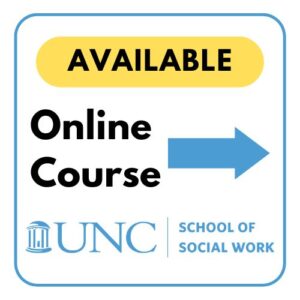Format: Self-paced / asynchronous program
Engage with this recorded program on your schedule.
 CE: 2 CE, read for more information on CEs
CE: 2 CE, read for more information on CEs
Fee: $35, read for more information on fees and scholarships
Description: Groups offer a powerful means to gain insight, receive and give support, and practice skills with others who share life experiences. Yet the moving parts and dynamics of group work that make them potentially transformative also present challenges for group leaders—e.g., how to balance content and process given time constraints, make group activities effective, deal with challenging members and situations that arise, and use interpersonal dynamics to foster growth. Drawing on the trainer’s expertise as a group facilitator, supervisor of interns leading groups, and from her experience teaching groupwork to graduate students, this course will offer participants a fresh look at group dynamics and therapeutic factors to best leverage the power of the group format. The tips shared represent common factors that span theoretical approaches and apply to all groups, ages, and practice settings.
Learning objectives: By end of the workshop, participants will be able to
- Discuss how to use group dynamics as a therapeutic tool and curative factor.
- Describe at least one strategy for dealing with problematic clients in group, such as involuntary clients, silent clients, monopolizers, and scapegoats.
- Identify at least 2 ways to incorporate the “here and now” approach in group therapy practice.
 Trainer: Marilyn Ghezzi, MSW, LCSW, is a clinical associate professor at the University of North Carolina at Chapel Hill School of Social Work. She received her BA and MSW from UNC-Chapel Hill. Ghezzi joined the School after 20 years of practice experience in the public mental health system. She draws on this experience to enhance her teaching of MSW students in courses on mental health theory and practice, including group work, brief treatment, dialectical behavior therapy, and differential diagnosis. A frequent recipient of teaching awards, she has won both the Dean’s Award for Teaching Excellence and the “Most Outstanding Faculty Member” (selected by graduating MSW class) multiple times and received the Distinguished Teaching Award for Post-Baccalaureate Instruction, an honor given to only four professors a year from the entire UNC-CH system. Ghezzi has continued to supervise students and trainees through the UNC SSW Field Office, Student Health Action Coalition (SHAC), and the UNC Department of Psychology and Neuroscience Community Clinic. Ghezzi has been a co-investigator on the Mental Health Specialty Probation study which offers a novel approach to reducing recidivism by providing additional training and consultation for probation officers.
Trainer: Marilyn Ghezzi, MSW, LCSW, is a clinical associate professor at the University of North Carolina at Chapel Hill School of Social Work. She received her BA and MSW from UNC-Chapel Hill. Ghezzi joined the School after 20 years of practice experience in the public mental health system. She draws on this experience to enhance her teaching of MSW students in courses on mental health theory and practice, including group work, brief treatment, dialectical behavior therapy, and differential diagnosis. A frequent recipient of teaching awards, she has won both the Dean’s Award for Teaching Excellence and the “Most Outstanding Faculty Member” (selected by graduating MSW class) multiple times and received the Distinguished Teaching Award for Post-Baccalaureate Instruction, an honor given to only four professors a year from the entire UNC-CH system. Ghezzi has continued to supervise students and trainees through the UNC SSW Field Office, Student Health Action Coalition (SHAC), and the UNC Department of Psychology and Neuroscience Community Clinic. Ghezzi has been a co-investigator on the Mental Health Specialty Probation study which offers a novel approach to reducing recidivism by providing additional training and consultation for probation officers.
References:
- Brown, N. W. (2013). Creative activities for group therapy. Routledge.
- Counselman, E.F. (2017). First you put your chairs in a circle: Becoming a group therapist. International Journal of Group Psychotherapy, 67, 124-133.
- DeLucia-Waack, J., Kalodner, C. & Riva, M. (2014). Handbook of group counseling & psychotherapy. SAGE Publications, Inc. doi: 10.4135/9781544308555
- Garvin, C.D., Gutierrez, L.M. & Galinsky, M.J. (Eds.). (2017). Handbook of social work with groups. The Guilford Press.
- Haen, C., Aronson, S. (Eds.). (2017). Handbook of child and adolescent group therapy: A practitioner’s reference. Routledge
- Malekoff, A. (2014). Group work with adolescents: Principles and practice. (3rd ed.). The Guilford Press.
- Yalom, I. D. & Leszcz, M. (2020). The theory and practice of group psychotherapy (6th ed.). Basic Books.